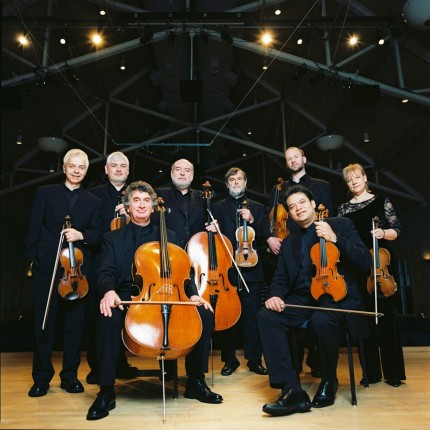Despite last-minute drama, Academy Chamber Ensemble opens UC Presents season in spirited style
As if the pressure of performing isn’t intense enough, the pitfalls of touring and tight scheduling can provide an extra jolt of cardio stimulation for musicians and presenters alike.
The Academy of St. Martin in the Fields Chamber Ensemble was slated to open the 72nd season for the University of Chicago Presents series Friday night at Mandel Hall. Yet the eight musicians, who flew into O’Hare the same afternoon, got stranded for hours at the airport when their rental car company had a computer meltdown. Fortunately, all was resolved and they arrived in Hyde Park in time, just ten minutes before the preconcert chat. It’s a testament to the musicians’ talent and professionalism that they played so well, even with the last-minute logistical drama.
The Academy of St. Martin in the Fields made its reputation in large part with music of Mozart under founder Sir Neville Marriner. Even after a half-century and generational changes in personnel, the Academy’s Wolfgangian bona fides remain first-class as shown by the evening’s opening performance of the Divertimento in D, K.136/125a.
The lithe, trim ensemble and tonal sheen in the opening Allegro was as characteristic as the poised refinement of the Andante, with notably elegant solos by first violinist Tomo Keller. The concluding Presto is one of the composer’s best early closers—a kind of frenzied Viennese hoedown—and the Academy musicians tore through the 16-year-old Mozart’s finale at lightning speed with galvanic vitality and airtight security.
Chamber reductions of Richard Strauss tone poems are not exactly thick on the ground. But Franz Hasenöhrl’s 1954 retooling of Till Eulenspiegel’s Merry Pranks for mixed quintet is so clever and effective, it makes one wonder why slenderized Strauss hasn’t been attempted more often.
Retitled Till Eulenspiegel—einmal anders! (another way), Hasenöhrl’s free transcription is a remarkable feat, distilling Strauss’s scoring for a hundred players down to just five instruments (violin, clarinet, horn, bassoon and double bass) without sacrificing anything essential.
Much of the instrumental writing is just as tortuous as in the original version, yet held no fears for the Academy musicians who served up a bravura and characterful reading. Clarinetist Timothy Orpen delivered a sassy and raucous portrait of the German trickster, with equally colorful playing by hornist Stephen Stirling and violinist Keller.
Schubert’s Octet is one of the least frequently heard of the composer’s mature masterworks. Scored for string quartet, double-bass, horn, clarinet and bassoon, it is the composer’s most expansive chamber work, spanning an hour and six movements, with a striking richness of melodic wealth and harmonic invention even by Schubert’s standard.
After the hectic transport issues, one could appreciate the unruffled equanimity of the Octet performance with the musicians displaying nimble agility, pristine intonation, and impressively seamless ensemble.
Still, there were moments when one wished for playing that was a bit more, well, ruffled. The music often calls out for an earthier, more robust response and the Mozartian style of the performance seemed more of the late 18th century rather than Schubert’s time.
The playing was unfailingly polished and sensitive yet one wanted more personality in the solos, and a warmer and deeper range of expression. While generally sunny and optimistic, there are dark shadows in the Octet. The melancholy of the Adagio felt skated over, and the jagged bass and cello tremolos that lead off and interrupt the cheerful finale barely presented a cloud on the horizon.
That quibble apart, the fine musicianship of the Academy members still provided ample rewards. The rustic vigor of the third movement was fully idiomatic and clarinetist Orpen launched the variations of the Andante in evocative fashion. The players seemed to relax and cut loose in the bumptious finale with more free-wheeling playing of greater abandon.
The Pacifica Quartet and pianist Marc-Andre Hamelin perform 3 p.m. Sunday at the Logan Center in the University of Chicago Presents series. The program includes Ligeti’s String Quartet No. 1, Dvorak’s Piano Quintet, Debussy’s Images (Book I) and selections from Book II of his Preludes. ticketsweb.uchicago.edu
Posted in Performances



